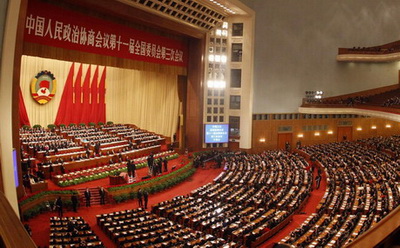China's Political Consultative Session Opens in Beijing

China's top political advisory body opened its annual plenary session in Beijing on Wednesday afternoon, with proposals to promote a low-carbon economy, improve the well-being of ordinary citizens and push ahead with economic restructuring all on the agenda of the conference, which is attended by over 2,100 delegates from around the country.
"The year 2010 is a crucial year for China to cope with the fall out from the global financial crisis and maintain stable and comparably rapid economic growth," said Jia Qinglin, Chairman of Chinese People's Political Consultative Conference (CPPCC) and number four in China's political pecking order, in his opening speech.
In outlining the main tasks for the CPPCC this year, Jia urged delegates to devote themselves to researching the development of recycling and the establishment of a low-carbon economy and carrying out a transformation of the country's model of economic development. In addition, he called on delegates to resist the impact of Western political models such as the multi-party system and a bicameral legislature.
The CPPCC national delegates are comprised of politicians from the Communist Party of China (CPC) and eight other recognized parties in China, leaders of minority ethnic groups, representatives of various social groups and organizations, scholar and experts from various fields.
Over the coming days, CPPCC delegates will take turns to present their proposals.
During the plenary session, the delegates are able to voice their views and concerns on a wide range of issues.
In keeping with tradition, the CPPCC session has opened ahead of the plenary session of China's parliament, the National People's Congress, which will open on Friday.
These two events, which run almost concurrently in Beijing through March 13, are commonly known as the "Two Sessions" or Liang Hui in Chinese.
The meetings are closely observed, as issues raised at the two sessions will often impact on the course of policy making in the country.
In an interview with Xinhua News Agency on March 1, Zhao Qinzheng, the conference's spokesman, revealed that given the strengthening of the economic recovery, issues concerning economic restructuring, reform of the country's model of economic development and the development of a low-carbon economy, would be the focus of this year's agenda.
This represents a shift away from last year's preoccupation with enacting measures to counter the effect of the global financial crisis.
In addition, the livelihood of ordinary people - a topic that touches on everything from housing affordability, the quality of education, access to medical services and income growth and distribution - will also receive a lot of attention from delegates.
As of 5 pm on March 2nd, the conference had received 454 proposals which are scheduled to be discussed over the course of the conference, delegates are also expected to deliver 370 speeches.
Over 3,000 reporters will cover the conference.
Links and Sources
CPPCC: Official Site (Chinese)
China Daily: Summary of Jia Qinglin Work Report (English)
The views posted here belong to the commentor, and are not representative of the Economic Observer |




















